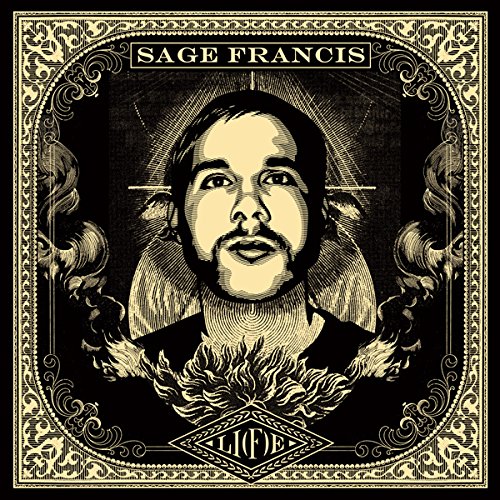
Sage Francis
Li(f)e
Release Date: May 11, 2010
Genre(s): Rap
Record label: Anti
Music Critic Score
How the Music Critic Score works
Album Review: Li(f)e by Sage Francis
Satisfactory, Based on 5 Critics
Based on rating 7/10
Putting his Anti label's indie rock connections to good use, Sage Francis’ Li(f)e features the alt-rapper collaborating with members of Califone, Death Cab for Cutie, Grandaddy, and other guitar-based outfits while being solely produced by Brian Deck, who had previously worked with Modest Mouse and Iron & Wine. Sonically, it’s a giant shift from his previous work as the otherworldly and often dark beats of the past are replaced by the traditional guitars, bass, and drums, but Sage is primarily the same, cynical as hell and able to knock listeners out of their comfort zone with lyrics that are as true as they are unsettling. As far as growth, his lurid and flippant lines -- a good example being “I heard God was coming/And she’s a screamer” from “I Was Zero” -- are complemented by more subtle blows against the empire as wisdom and restraint come into play on the album’s meatier numbers.
Based on rating 6.3/10
Sage Francis has never feared silliness. I once watched the burly, verbose indie-rapper end a show by kneeling and touching his DJ's turntables while the DJ chopped up Martin Luther King's "I have a dream" speech with the Hendrix version of "The Star-Spangled Banner". And he brings that same tendency toward ridiculously broad gestures in his lyrics, which bounce back and forth between leftist fervor and self-lacerating slam-poetry.
Based on rating 6/10
At one point on his new album, Li(f)e, Sage Francis insists, “I don’t want you to like me.” It’s an interesting claim to look into, because Francis surely doesn’t mind making us uncomfortable. Whether spinning verbose, brash freestyles, or populating his records with confrontational screeds and downright uncomfortable images, Francis follows his own twisted muse every step of the way. But he also delivers this all with a biting humor, cut only with a lot of heart, and that combination gives him an awful lot of charm, even at his most abrasive.
Based on rating 2.5/5
The idea that good intentions are worth something, in and of themselves, is fallacious to say the least. Perhaps they deserve additional credit or consideration, but in truth, good intentions are rarely rewarded — or even appreciated for that matter. Sage Francis, it can be assumed, set out to make an album of inherent value, a serious, probing, philosophical album, confrontational but kind-hearted.
Based on rating 2.0/5
For a guy labeled by his album’s press release as the world’s best freestyle rapper, Sage Francis spends a lot of time talking on Li(f)e, a troubled album whose strange production choices expose his biggest weaknesses. The result is a collection of songs that never fully gets off the ground, spooling out like never-ending spoken introductions, as the rapper futilely waits for his beats to come to life. Francis’s best work in the past has been loud and bombastic, consisting of jagged compositions that matched his vigorously angry but not totally clear-headed subject matter.

